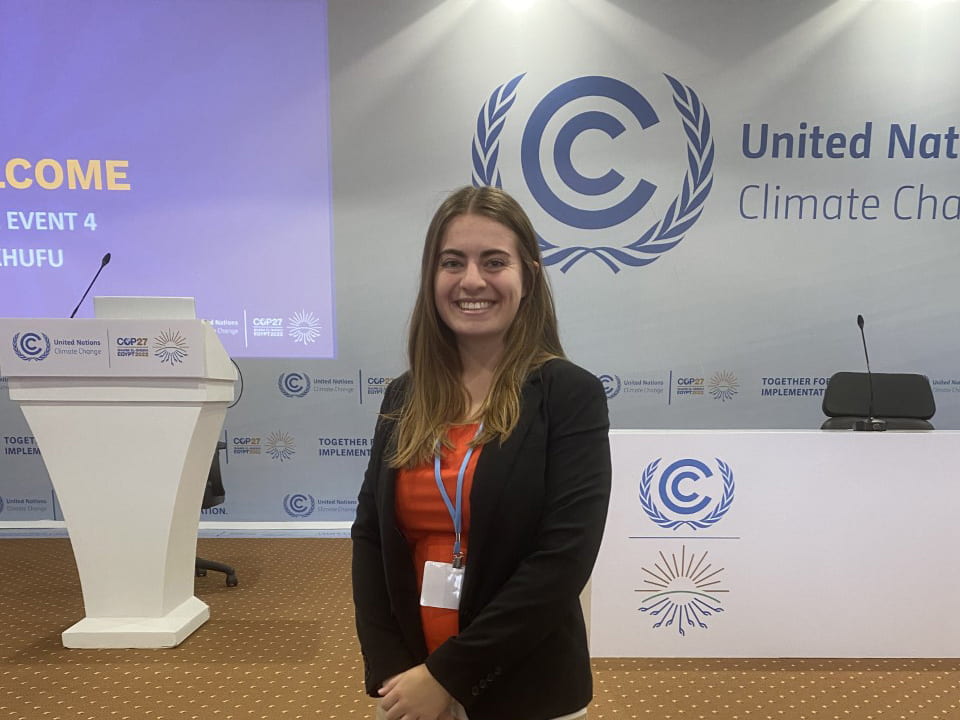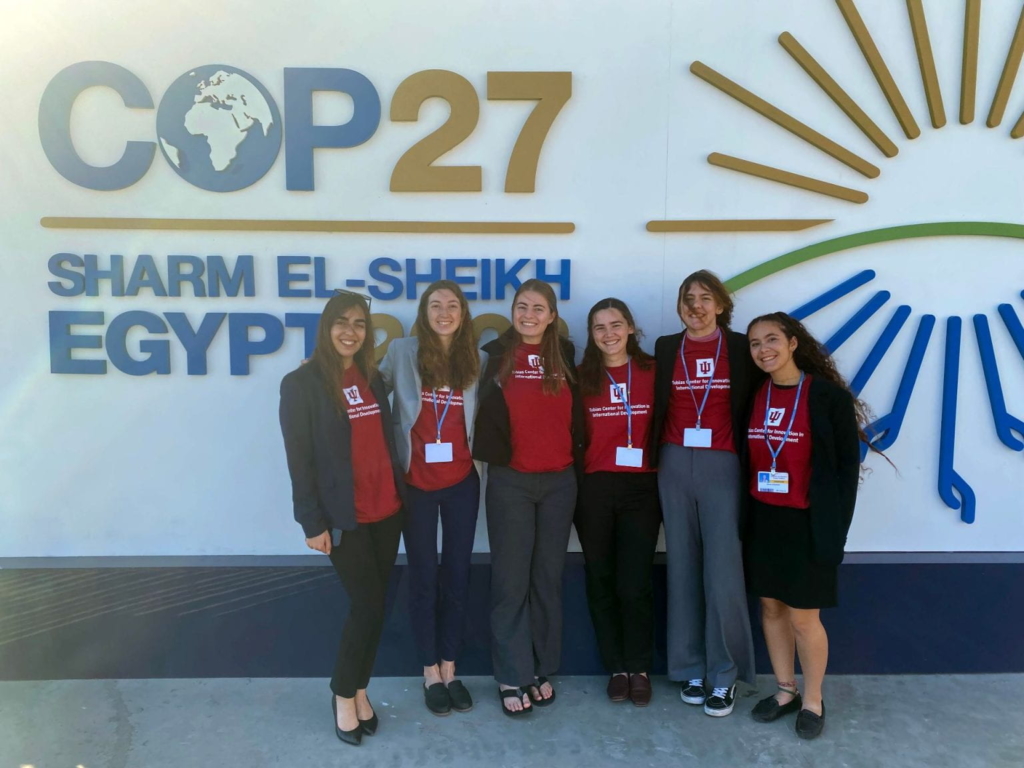
Kara Lahner, a senior at IU Kelley School of Business, attended the United Nations Climate Change Conference COP27 in November.
How’s this for experiential learning? A senior at Indiana University’s Kelley School of Business, who spent this last semester researching Carbon Capture Utilization and Storage, spent a week in November in the company of some of the world’s foremost business and political leaders in addressing climate change.
Lehner, co-president of Kelley’s Net Impact Sustainable Business Club, snagged a rare student pass to COP27, the 27th Conference of the Parties to the United Nations Framework Convention on Climate Change in Sharm el-Sheikh, Egypt. She was one of two Kelley undergrads and 14 Indiana students to attend the conference, and IU was one of just a few universities in the world to send a student delegation.
Lehner talked with the CEO of ERM, the largest sustainability consulting company in the world; listened to U.N. Secretary General António Guterres, former U.S. Vice President Al Gore, and former New York City Mayor Michael Bloomberg speak from the podium; and shared a room with more than dozen presidents and prime ministers gathered to hash out frameworks for battling climate change.
“In addition to providing information about my research, this experience completely altered my perspective on climate change and provided me so many new cultural experiences,” Lehner told Kelley’s undergraduate blog after her trip. “I am incredibly grateful for this opportunity to conduct my research and connect with many scholars and passionate individuals committed to combating climate change.”
LEARNING FROM THE WORLD’S EXPERTS
Experiential learning – learning by doing – is a cornerstone of many top-ranked business schools. Kelley School of Business, which tied for 11th place in our annual ranking of undergraduate business schools, is certainly no exception.
Among a long list of experiential opportunities at Kelley is I-Core, a required 13-credit-hour semester that includes a 10-day team project in which Kelley juniors work on a real-world business case. The innovation was one reason we picked the school as one of our 10 undergrad schools to watch in 2022. Kelley students also compete in case competitions around the country, including its very own Kelley Impact Competition. And The b-school’s Alternative Break Program has been sending students to work on social problems around the world for more than three decades.
Lehner attended the world’s preeminent conference as part of IU’s international climate government course, a highly selective, research-oriented course taught by Jessica O’Reilly, associate professor of international studies in the Hamilton Lugar School of Global and International Studies. Each year, the class dives into important climate compacts such as the Paris Agreement and Kyoto Protocol in preparation for the COP conference. Each student gets to attend a week of the two-week conference.
Lehner’s semester-long research project focused on carbon capture utilization and storage, specifically looking at future market growth and the technological investments governments, companies and other organizations are making. At the conference, she spoke with top scholars, corporations, and innovators in the space, and was required to interview at least five experts in the field.

Kara Lehner, center, was one of 14 IU undergraduates attending COP27 as a delegate in November. Courtesy photo
A highlight was meeting with Tom Reichert, the CEO of ERM and a 1991 Kelley MBA. The two talked about the carbon capture utilization and storage market and ERM’s other carbon reducing projects. Reichert spoke about the challenges companies face when developing their decarbonization strategies as part o the Sustainable Innovation Forum, and he gave the keynote speech at the World Business Council for Sustainable Development.
“From my research, my main takeaways are that the CCUS market is expected to reach a value of $33.6 billion by 2030, which is huge considering it’s only valued at roughly $1 billion today. It’s also estimated that total carbon capture capacity will be 1,670.2 million tons per year by 2030,” Lehner said.
“From the COP, I learned that the main barriers holding CCUS companies back from scaling up are a lack of private investment, lack of effective regulation, and lack of overall standards and a price of carbon.”
ACCOMPLISHMENTS & TAKEAWAYS
In Lehner’s opinion, one of the big accomplishments of this year’s conference was the first breakthrough agreement to provide “loss and damage” funding for vulnerable countries affected by climate disasters.
“While the specifics haven’t been worked out yet — they are set to be discussed over the next year — this is a huge win! Creation of this fund has been in discussion for about 30 years, so it was really exciting to see something come out of COP27,” she said.
She also noticed that nature-based solutions seemed to be the latest buzzwords of the climate conference. “Everyone was talking about them, especially in negotiations which is exciting as this will likely be a big topic at the next few COPs,” she said.
However, a disappointment was that phasing out fossil fuels was not made mandatory, she noted.
Kelly Eskew, a clinical professor of business law and ethics at Kelley, attended the conference as part of the IU delegation. This kind of experience is invaluable to students like Lehner, she says.
“It’s absolutely life changing,” Eskew said in an IU web article. “This sets some students on a path that is going to be the work of their life, because of the contacts they make and experiences they have.
“Climate issues are on the minds of investors and thus businesses – and every executive department of the government. This course prepares students like Kara to understand the science as well as the political challenges around climate action, and to contribute to market-based, regulatory, and diplomacy-related solutions.”
DON’T MISS: WANT TO STUDY ABROAD? THIS BUSINESS PROF & YOUTUBE TRAVEL EXPERT HAS PRACTICAL ADVICE AND POETS&QUANTS’ TOP 50 UNDERGRADUATE PROFESSORS OF 2022











Questions about this article? Email us or leave a comment below.